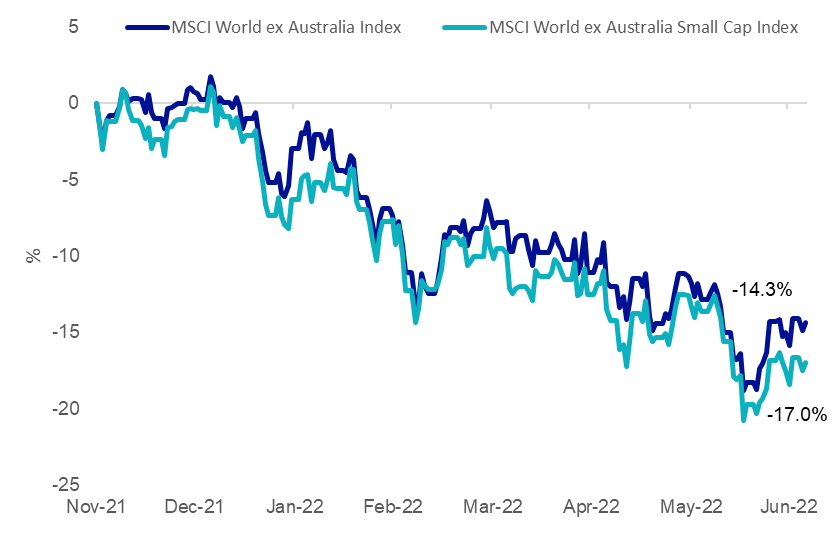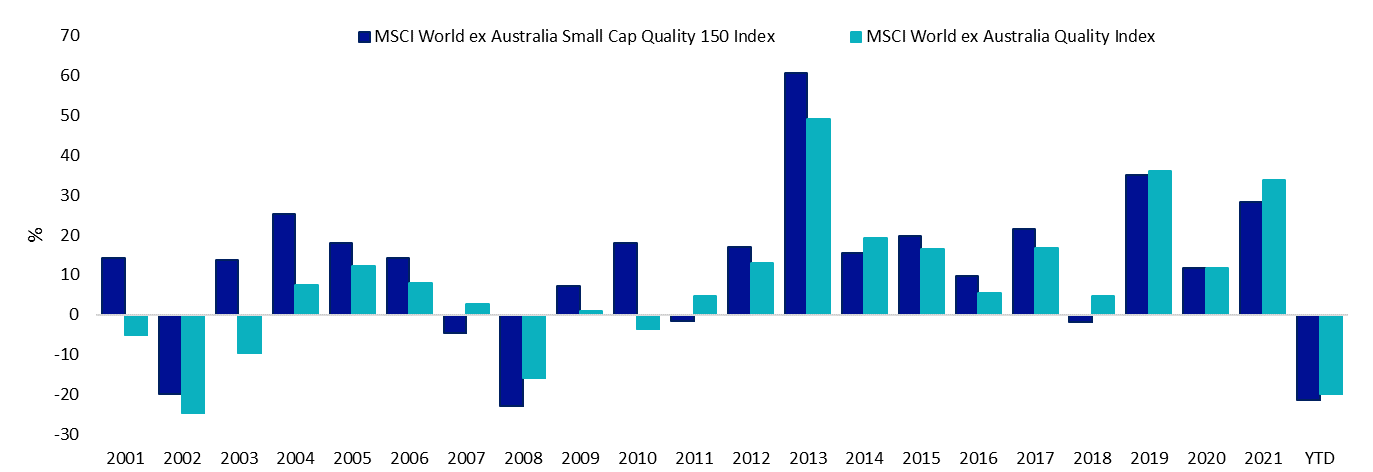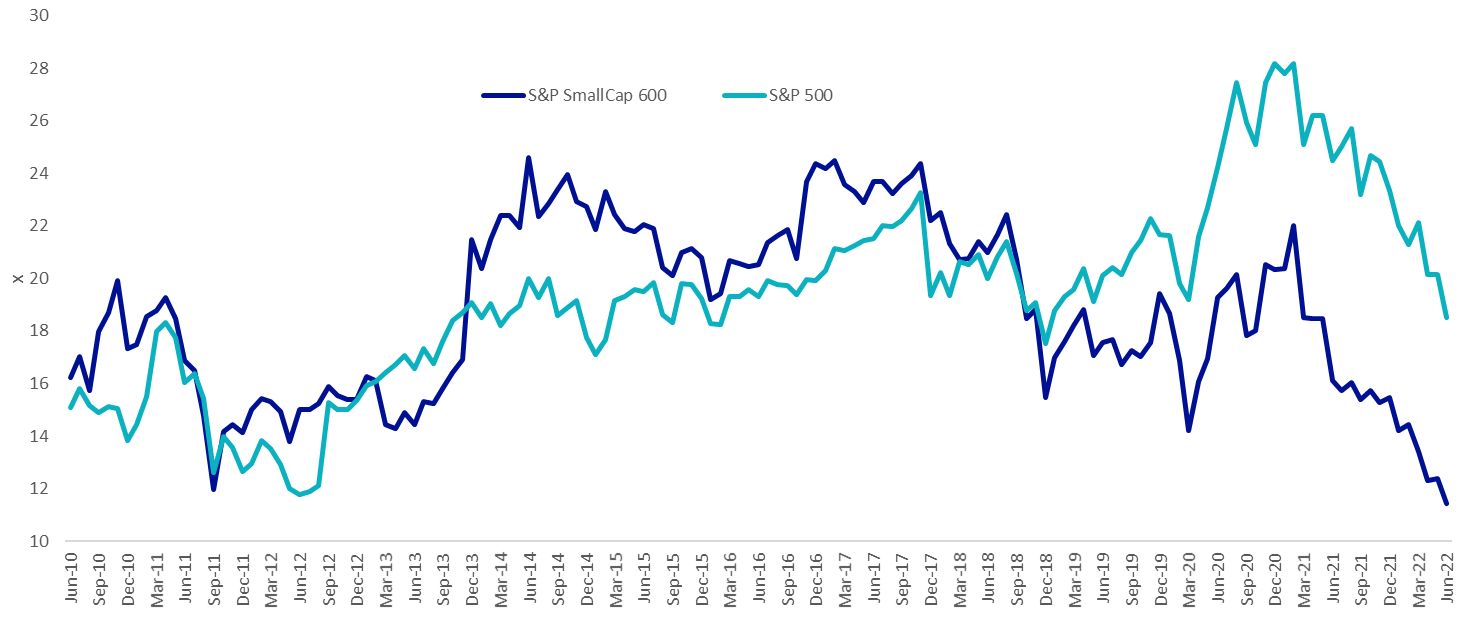Diamonds in the rough
Markets are hopeful, and seemingly priced for a ‘soft landing’ but the reality is a ‘hard landing’ remains a persistent threat. Savvy investors are preparing for the next cycle following a hard landing, which leads to low growth and a period of recovery. As in the past, during this type of cycle, small-caps have offered more upside than large caps.
While the markets watch on central banks do all they can to fight inflation, astute investors are looking for pockets of opportunities. Beneath the surface, dispersion within asset class returns across sectors and styles remains high.
Markets are hopeful, and seemingly priced for a ‘soft landing’ but the reality is a ‘hard landing’, that is when an economy enters recession after an interest rate hiking cycle, remains a persistent threat. Manoeuvring portfolios to meet the challenges and idiosyncrasies of these capital markets is no easy feat.
Navigating the world of investment opportunities through Smart Beta ETFs has empowered advisers and investors to build robust portfolios and target outcomes. The Quality Factor, inspired by investment pioneers such as Benjamin Graham and Warren Buffett, has demonstrated its prowess through the cycle with the VanEck MSCI International Quality ETF (QUAL) offering superior risk-adjusted performance and an enviable track record relative to active managers, all for a fraction of the cost and with full transparency.
Savvy investors are reassessing portfolios and preparing for the next cycle following a hard landing, which leads to low growth and a period of recovery, as in the past, during this type of cycle, small-caps have offered more upside than large caps because they have fallen further in the market downturn. Australian advisers are no strangers to Australian small companies but the world is far bigger than the ‘Small Ords’. The international small-cap universe presents over 4,000 companies and, as size is a relative term, many of these companies are not that small.
Bears and central banks on a tight rope
The market sell-off since, of ‘transitory’ the Fed declared at the end of last November “it was probably a good time to retire that word,” and started fighting inflation.
Globally, small- and mid-sized companies have been hit more than their large cap counterparts.
Figure 1: Global large- and small-cap performance 30 November 2021 to 6 July 2022
Source: Morningstar Direct, Returns in Australian dollars. Past performance is not a reliable indicator of future performance.
Savvy investors are starting to prepare their portfolios to navigate through potential growth/recovery setbacks such as a hard landing, COVID clusters and poor economic data.
One of the beneficiaries could potentially be international small companies.
Quality factor in low growth environments
Figure 1 below shows that international quality small-cap stocks, as represented by the MSCI World ex Australia Small Cap Quality 150 Index (QSML Index), has fallen further than the 19.85% fall of the large- and mid-cap MSCI World ex Australia Quality Index, posting a return of -21.42% so far in 2022. International quality small-cap companies also did well in previous recoveries following: 1) the global slowdown in the early part of the century following the dotcom bubble; and 2) for many of the low-growth years following the GFC.
Figure 2: Calendar year performance - MSCI World ex Australia Small Cap Quality 150 Index and MSCI World ex Australia Quality Index

Source: VanEck, Morningstar Direct, as at 30 June 2022. You cannot invest directly in an index. Past performance of the index is not a reliable indicator of future performance of QSML.
Both of these periods coincide with periods following a US recession (2001 & 2007 to 2009). There is a fear that the US is headed for a recession again, as the Fed tightens rates.
Small caps in the US, for example, relative to large caps, are at their lowest valuations in over 12 years.
Figure 3: Price to equity (P/E) of S&P 500 and S&P SmallCap 600

Source: Factset
But as you know, with small companies investing, it pays to be prudent. The international benchmark, like the S&P/ASX Small Ordinaries, includes companies that are not attractive from an investment point of view, it also includes in excess of 4,000 companies. The same issue is true when you consider an international mid- and large- cap passive approach; not all of the 1,500 plus in the MSCI World ex Australia Universe are attractive from an investable point of view.
Quality is a factor approach that has shown historical outperformance in the mid- and large-cap universe. Australian investors have experienced this with the VanEck MSCI International Quality ETF (QUAL). It is worth noting that past performance is by no means a reliable indicator of future performance.
The VanEck MSCI International Small Companies Quality ETF that trades under the ASX ticker ‘QSML’ is a diversified, international small companies quality portfolio. QSML tracks the MSCI World ex Australia Small Cap Quality 150 Index (QSML Index) and may be used by investors looking to take advantage of a global recovery in a slow growth environment/post-recession environment.
Key risks
An investment in the ETF carries risks associated with ASX trading time differences, financial markets generally, individual company management, industry sectors, foreign currency, country or sector concentration, political, regulatory and tax risks, fund operations, liquidity and tracking an index. See the PDS for details.
Published: 14 July 2022
Any views expressed are opinions of the author at the time of writing and is not a recommendation to act.
VanEck Investments Limited (ACN 146 596 116 AFSL 416755) (VanEck) is the issuer and responsible entity of all VanEck exchange trades funds (Funds) listed on the ASX. This is general advice only and does not take into account any person’s financial objectives, situation or needs. The product disclosure statement (PDS) and the target market determination (TMD) for all Funds are available at vaneck.com.au. You should consider whether or not an investment in any Fund is appropriate for you. Investments in a Fund involve risks associated with financial markets. These risks vary depending on a Fund’s investment objective. Refer to the applicable PDS and TMD for more details on risks. Investment returns and capital are not guaranteed.
QSML is indexed to a MSCI index. QSML is not sponsored, endorsed or promoted by MSCI, and MSCI bears no liability with respect to QSML or the MSCI World ex Australia Small Cap Quality 150 Index. The PDS contains a more detailed description of the limited relationship MSCI has with VanEck and QSML.




